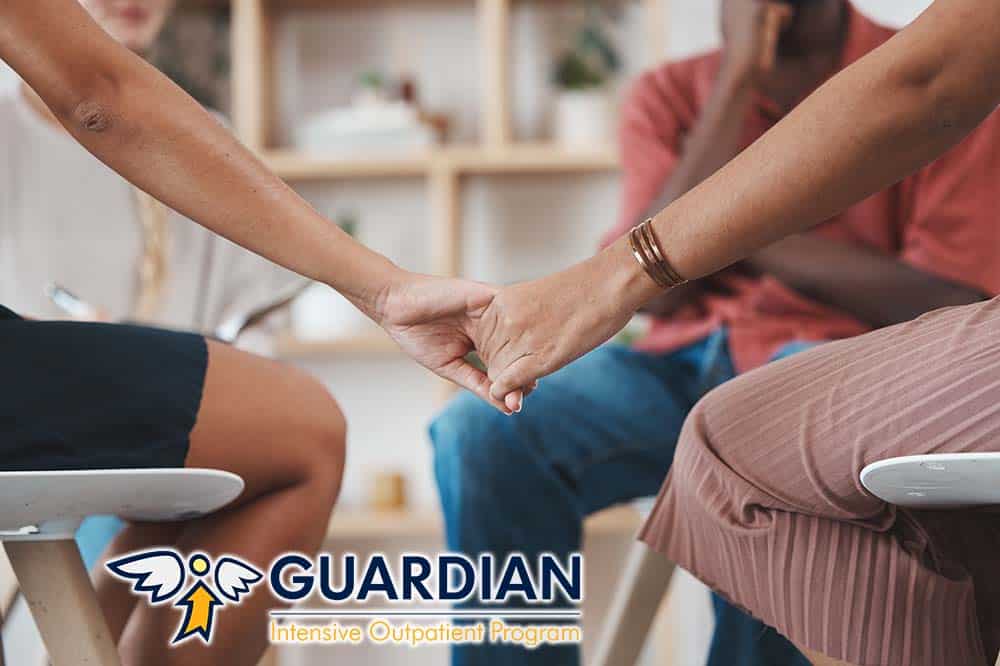Deciding to enter addiction recovery might feel daunting, and can lead to feelings of overwhelm and loneliness. You might feel like you are alone in your struggles; as if no one quite understands what you’re going through or knows how to help. Local addiction programs are one way to find support and community on your journey. Local programs can be more accessible and offer a range of benefits, including personalized care and a supportive environment.
If you or someone you care about are looking for a local addiction recovery program, Guardian Recovery Network can help. We will work with you to develop an individualized and effective program to help you recover from addiction and get you on the road to long-term recovery. We believe in the benefits of a full continuum of clinical care, beginning with medical detoxification, transitioning into a higher level of treatment, and concluding with personalized aftercare planning. Contact us today to learn more about our treatment options in your area.
Benefits of Local Addiction Programs
Local addiction programs offer various benefits that out-of-town programs do not. They are more accessible, which can be vital if you have work, school, or family commitments that make it difficult to commit to a long-term out-of-town program. Local addiction programs may also be more affordable than out-of-town programs, as you can remain within your insurance network.
Age Restrictions
It’s important to check if the program caters to specific age groups. Some addiction programs may primarily focus on young adults or seniors, while others might cater to middle-aged individuals. Age-specific treatment programs may provide tailored treatment plans and therapy methods, improving the chances of successful recovery.
What Is the Program’s Treatment Environment Like?
The treatment environment plays a crucial role in the recovery process. Determining what environment would be most conducive to your recovery is essential.
Addiction programs may offer varying levels of service, including residential or outpatient facilities.
Residential facilities provide a safe, structured environment if you require more supervision and support. They are especially helpful if you have a severe addiction or need to undergo detox as part of your recovery. Inpatient facilities usually offer comprehensive treatment, including medical-assisted therapy and therapeutic care.
Outpatient facilities allow you to attend scheduled treatment and counseling sessions while participating in everyday activities like work or school. Outpatient programs tend to be more affordable than inpatient programs, although this option does not provide 24-hour monitoring.
Facility Amenities
The amenities provided by a facility can significantly impact your recovery experience. Some programs offer luxury amenities like spas, fitness centers, or outdoor activities, while others provide basic necessities.
It’s important to consider which amenities are necessary for you, but it’s essential not to let this be the only factor in your decision. Keep in mind that extras can significantly increase the cost of treatment.
We Are Here For You
Let Us Help You Heal
Our Drug & Alcohol addiction treatment experience is second to none.
Learn how we can help by speaking with one of our Treatment Advisors today.
Are Family Involvement & Support Offered?
Family involvement in the recovery process can be beneficial to all parties. It’s important to check if the program provides family therapy sessions, workshops, or educational lectures. Some inpatient programs allow family visits during the recovery process.
The program’s stance on family involvement is key. Some may require family involvement in the recovery process, as addiction can be a family disease, impacting individuals’ loved ones. Others may offer family services but may not require them.
What Is the Program’s Staff-to-Patient Ratio?
The staff-to-patient ratio can indicate the level of care provided by the program. A lower staff-to-patient ratio means that staff can spend more time with each patient, providing more personalized care. Checking the qualifications of the staff, such as education, licensure, and experience, can ensure that you receive medical and therapeutic care from adequately trained professionals.
Staff Qualifications
Ideally, staff members should hold degrees or certifications in psychology, counseling, or social work, with specialties in addiction treatment. They should also have a deep understanding of addiction and its impact on mental and physical health and experience in treating co-occurring disorders. Personal qualities that make a good staff member include empathy, compassion, and a non-judgmental attitude, as well as the ability to tailor treatment plans to meet each patient’s unique needs. With qualified staff, addiction treatment centers can help you overcome addiction and achieve long-lasting recovery.
How Does the Program Address Co-occurring Disorders?
Addiction is a complex issue that often co-occurs with mental health disorders. According to SAMHSA, over eight million adults in the US battled both a mental health and substance use disorder in 2020 alone.
If you have a co-occurring disorder, it’s essential to seek out a program that offers this approach. Some programs provide dual-diagnosis treatment, simultaneously treating addiction and co-occurring disorders. Others may have mental health professionals available to address these conditions alongside addiction recovery. By addressing co-occurring disorders, addiction programs can help you achieve sobriety, improved mental health, and an enhanced quality of life.
How Does the Program Approach Addiction Treatment?
Local addiction programs offer various approaches to addiction recovery. Some of these may include:
Group Therapy
Group therapy offers a supportive, therapeutic setting where individuals can share their experiences and receive feedback from others. Group sessions can be beneficial if you feel isolated or have difficulty expressing emotions.
Individual Counseling Sessions
Individual counseling sessions are one-on-one sessions between a patient and a therapist. These sessions offer personalized attention, and therapists tailor treatment plans based on your specific needs.
Medication-Assisted Treatment
Medications can assist individuals in managing withdrawal symptoms and cravings. Medication-assisted treatment often combines medication with therapy and counseling to provide comprehensive treatment.
Alternative Therapies
Alternative therapies, such as art therapy, music therapy, and yoga, can provide creative outlets for individuals. These therapies can also help individuals manage their emotions in healthy ways and learn new coping skills.
Treatment Philosophy & Holistic Care
When it comes to addiction treatment, incorporating a holistic approach that focuses on the mind, body, and spirit has become increasingly popular. Rather than just treating the physical symptoms of addiction, holistic addiction treatment programs aim to bring the whole person into alignment for a well-rounded recovery.
Holistic addiction treatment programs believe that you can take charge of your own healing and promote healing through the integration of mind, body, and spirit connections.
Levels of Care
Addiction treatment programs offer a range of care levels to meet your unique needs. The three primary levels of care are:
- Residential or inpatient treatment.
- Partial Hospitalization.
- Outpatient.
- Intensive outpatient (IOP).
Addiction Treatment Therapy & Mental Health Counseling Services
Combining addiction treatment therapy with mental health counseling can be effective if you suffer from substance abuse and psychiatric disorders. According to a study by the National Center for Biotechnology Information, you are more likely to misuse substances if you have a psychiatric disorder. With the help of integrated treatment, you have a better chance to recover from addiction and manage your mental health.
Moreover, the Center for Evidence has revealed that historically, people with co-occurring disorders have often been excluded from mental health treatment due to their substance use disorders. Integrated dual disorder treatment addresses this issue, supporting you based on your specific needs rather than labeling you with a disorder.
Relapse Prevention & Aftercare Support
While addiction is a complex and multi-faceted problem, treatment focuses on achieving and maintaining abstinence from drugs or alcohol — but recovery also requires you to make lifestyle changes and develop new skills to prevent relapse.
Relapse prevention provides strategies to recognize challenges ahead of time and helps you manage triggers when they occur. Relapse prevention programming includes personalized coping strategies such as cognitive-behavioral therapy (CBT), which teaches you how to identify negative thought patterns and replace them with healthier alternatives. Other relapse prevention techniques include utilizing social support networks or engaging in activities that promote self-care, like yoga, mindfulness, or art therapy.
Aftercare support is as important as the initial treatment phase, providing additional guidance during the transition between residential treatment centers and everyday life. Aftercare services may include continuing care programs, such as group meetings to receive peer support, counseling sessions to address any persisting issues related to addiction recovery, or family counseling for better understanding among family members. All these services work together to foster long-term sobriety by helping you build a healthier lifestyle for yourself.
Begin Healing Now!
Have A Call With One Of Our Treatment Advisors
Don’t Suffer Any Longer
Contact Us Today
No matter the substance, the best way to overcome addiction is with the help of experienced, trusted professionals like those at Guardian Recovery Network. We provide comprehensive treatment, including medically-assisted detox, therapy, specialty programs, and reintegration support. Our caring and skilled administrative, medical, and clinical teams will guide you through every step of your recovery process from the first time you call. We provide a complimentary assessment and a free insurance benefits check and help coordinate local travel to our facility. All you have to do is ask; we will take care of the rest. Contact us today.
Get Started Now
Give us a call 24/7
(888) 693-1894


Reviewed for accuracy by:
Anna Marie Barrett LCSW, CYT
Anna earned her Masters of Social Work at Barry University in Miami, FL in 2017 and completed her internship in co-occurring disorders. Anna has a Bachelors of Art in Religious Studies from Naropa University and is a certified yoga and meditation instructor. Anna has received specialized training in somatic counseling with an emphasis on body-centered psychotherapy.




















